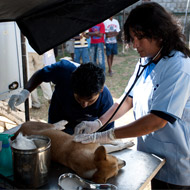
WSAVA petition secures over 11,000 signatures
All veterinary surgeries in Sri Lanka would cease to operate if ketamine was not available. That's according to Dr Ganga de Silva, president of the Society of Companion Animal Practitioners of Sri Lanka.
In 2014, China called for a worldwide ban on ketamine following widespread misconception that it is only a ‘recreational drug’. But Dr Silva says that almost all veterinary surgeons in Sri Lanka rely on ketamine for anaesthesia.
"The result would be suffering for animals and it would seriously impact our ability to control rabies as we would not be able to carry out spay and neuter programs on stray dogs," she said.
Earlier this year the WSAVA launched an online petition to secure access to ketamine as an essential veterinary medicine. So far, the petition has received over 11,300 signatures - with 15,000 the next milestone.
The petition followed a review by the World Health Organisation that concluded ketamine does not cause a global public health threat and that control would limit access for those using it as an anaesthetic.
This view was confirmed at a meeting of the UN Commission on Narcotic Drugs in March 2016, helped by support from the global medical and veterinary communities. However, China has since repeated its view that ketamine should fall under international scheduling.
"Ketamine is a safe anaesthetic which can be used without oxygen, ventilators, electricity and the support systems required for other products, making it the only anaesthetic suitable for both medical and veterinary use in lower and middle-income countries," said WSAVA president Dr Walk Ingwersen.
"If developing countries were denied access to it, which would be the effect of international scheduling, the effects on veterinary medicine, human health and animal welfare would be devastating,” he said.
Dr Nancy Shaffran, president of the International Veterinary Academy of Pain Management, added: “In addition to its use as an anaesthetic agent, ketamine is a critical medication used in the pain management in animals. The mechanism of action of ketamine (NMDA receptor antagonism) delivered as a Constant Rate Infusion has been well established to be effective in the prevention and correction of severe neuropathic pain and spinal cord wind-up.
“The loss of ketamine in veterinary practice would result in the needless suffering of many patients and we strongly oppose this action."
The WSAVA are continuing with their push to secure the future of ketamine as a veterinary and human medicine. All those interested can sign the petition at http://chn.ge/1RFSou6.
Image (C) WSAVA



 The Animal and Plant Health Agency (APHA) has updated its online reporting service for dead wild birds.
The Animal and Plant Health Agency (APHA) has updated its online reporting service for dead wild birds.